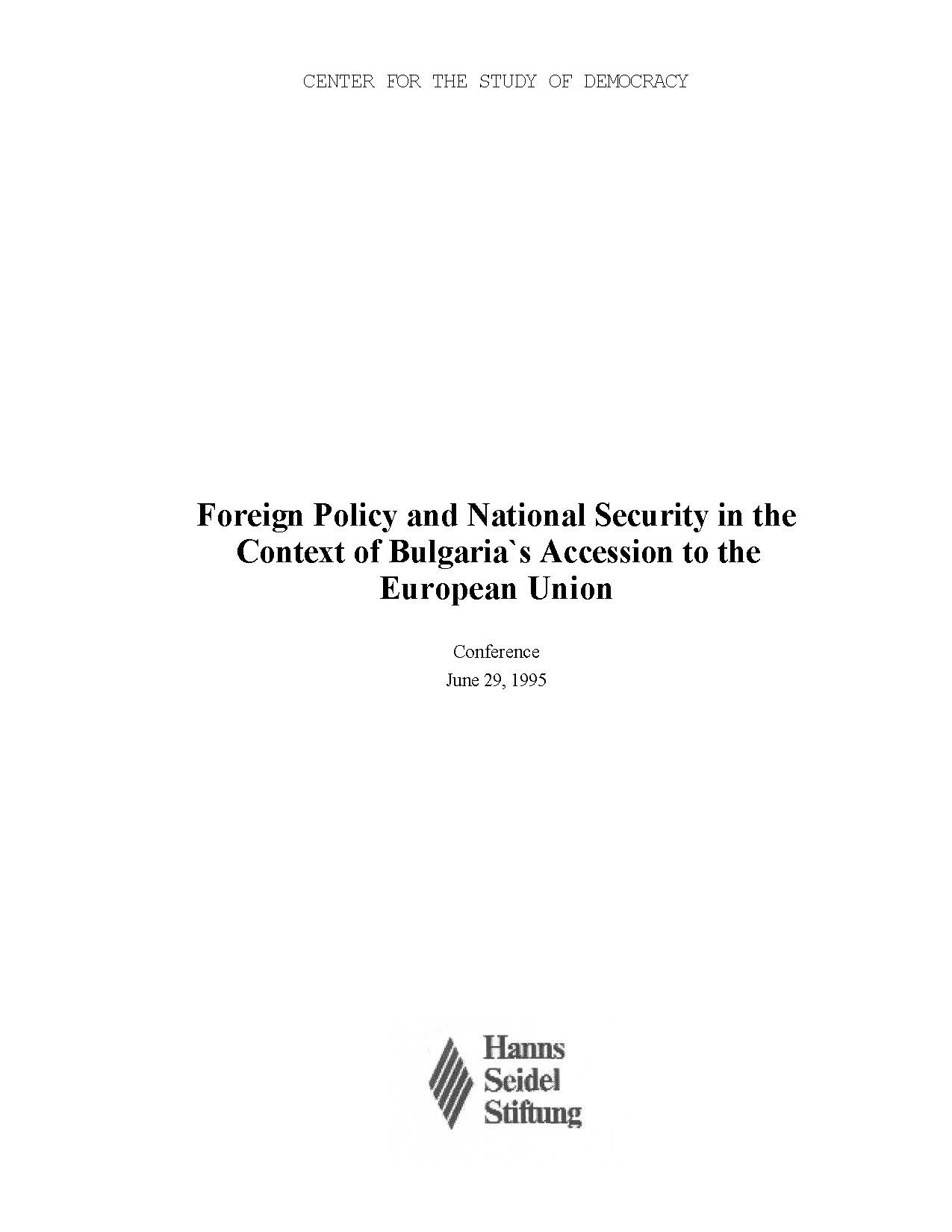
Foreign Policy and National Security in the Context of Bulgaria`s Accession to the European Union
The text includes the conference proceedings of the event held on 29 June 1995.
More...We kindly inform you that, as long as the subject affiliation of our 300.000+ articles is in progress, you might get unsufficient or no results on your third level or second level search. In this case, please broaden your search criteria.

The text includes the conference proceedings of the event held on 29 June 1995.
More...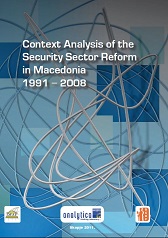
This paper looks at the general political and security sector context in the last two decades since Macedonian independence, and traces the major trends and events that shaped the political developments and progress with security sector reforms in post-communist Macedonia. For the purpose of this paper, the analysis of the post-communist transition period is divided in three parts, corresponding to the three periods on which we divided the context since 1991, for the sake of greater clarity and analytical coherence. For each of these three periods, we conducted an analysis of major political developments as well as institutional change. Based on this analysis, each period is qualified as characterised by a specific nature, whether post-authoritarian, conflict, postconflict, or integrationist. In the Annex attached to this paper, a short overview of the key political actors and their role in the security sector reforms and the political transition in Macedonia is offered. The first period analyzed is the period from the declaration of independence from Yugoslavia, in 1991 until the ethnic conflict in 2001. These years mark the first decade of independent statehood and democratic politics in Macedonia. The second period stretches from the ethnic conflict in 2001 until the NATO Summit in Bucharest in early 2008. The 2001 conflict had a profound impact on the political and security context in Macedonia. It produced inter-ethnic violence and culminated in a far-reaching reform of the constitutional and institutional set-up of Macedonian democracy.
More...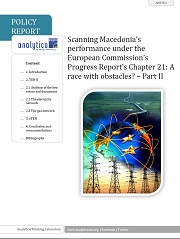
This policy report aims at presenting and clarifying Macedonia’s performance under chapter 21 in 2010 and at inspecting the quality and the sustainability of the progress achieved in order to define the future challenges and to offer the relevant institutions research based recommendations for further progress under the chapter. Having covered the TEN-T part of chapter 21 in a previous publication, this policy paper will cover only the TEN-E and the eTEN part of chapter 21.
More...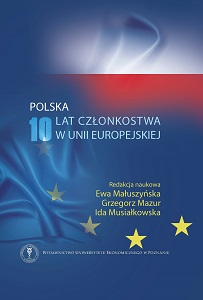
Celem artykułu jest próba oceny znaczenia uczestnictwa Polski w jednolitym rynku europejskim dla wybranych uwarunkowań mobilności edukacyjnej i zawodowej młodych Polaków. Zasadniczą tezą jest natomiast stwierdzenie, że udział Polski we wspólnotowych programach edukacyjnych zwiększa szanse młodych ludzi na rynku pracy.
More...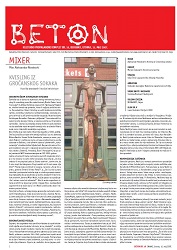
MIXER, Aleksandar Novaković: Kvisling iz Gročanskog sokaka; CEMENT, Marjan Čakarević: Skromnost praznine; ŠTRAFTA, Saša Ćirić: Logocentričko čišćenje filozofije; ARMATURA, Slobodan Georgijev: Nadzirana nezavisnost za Srbiju; VREME SMRTI I RAZONODE, Tomislav Marković: Nedićgrami; BULEVAR ZVEZDA, MEDAKOVIĆ, Dejan; BLOK BR. V, Lazar Bodroža: Patrijarh 3000
More...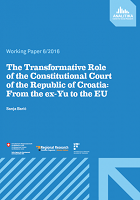
As part of a general study on the role and impact of constitutional adjudication in transitional countries of South East Europe, this paper analyses the operation of the Constitutional Court of the Republic of Croatia after the dissolution of the Yugoslav federation. It aims to answer the posed research questions as to the extent of the Court’s activism in the field of transitional constitutional justice and, consequently, the Court’s success/failure in promoting the legal transition from a socialist order to a modern constitutional democracy. In that view, a narrow but paradigmatic selection of the Court’s case-law is analyzed. Factors that have contributed to the Court’s performance (e.g. political conditioning, personal features) are taken into account, as well as public opinions and attitudes toward its rulings. The first part of this paper presents an overview of the Court’s history, composition and competences, while the next chapter explains three distinct periods of the Croatian constitutional reality, that are detectable from 1991 to 2016. The third part, containing a presentation of particular rulings, tackles: the development of a standard constitutional test (3.1.); post-war justice in relation to popular expectations (3.2.); the clash between social justice and budgetary constraints (3.3.) and the constitutional boundaries of democracy (3.4.). The final part contains an in-depth analysis of incentives for, methods of and threats to the Court’s activism/transformative role. It will be argued that while the Court managed to protect core constitutional values and principles (even during the Homeland War), its greatest success is detectable in the process of the Europeanization of the Croatian legal order. Recent overall detrimental social occurrences (the economic crisis and socio-political radicalization) coupled with certain objective shortcomings of the Court have led to a deterioration of its status and have put its very existence in peril.
More...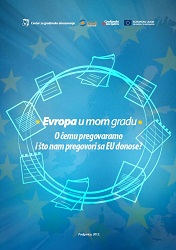
Crna Gora će proći do sada najzahtjevniji i najsloženiji put pregovora sa Evropskom unijom (EU). Činjenica da će pregovori početi poglavljima 23 – Pravosuđe i temeljna prava i 24 – Pravda, sloboda i bezbijednost, kao i da će ova poglavlja ostati otvorena do samog kraja, ukazuje na veličinu izazova sa kojim će biti suočena Crna Gora tokom pregovaračkog procesa. U publikaciji pred vama je kratak osvrt na ono čime će se veliki broj ljudi uključenih u pregovore po raznim osnovama, a posebno crnogorske nadležne institucije, baviti kroz usklađivanje crnogorskog pravnog okvira sa komunitarnom tekovinom EU, ali i kroz riješavanje raznih nivoa problema tokom cijelog procesa pregovora i nakon njih. Naša je namjera da približimo široj javnosti sadržaj pregovaračkih poglavlja projektujući ih na crnogorski model pregovora. Naime, jedna dimenzija ovog složenog procesa je to što će hiljade ljudi konkretno, dugo i naporno raditi na ispunjavanju preporuka EU i usklađivanju pravnog okvira sa standardima EU, odnosno izgradnji institucionalnih i demokratskih kapaciteta crnogorskog društva. Ali, druga, podjednako važna dimenzija jeste što će se paralelno svi građani i građanke Crne Gore, polako ali sigurno, kretati ka razumijevanju i prihvatanju konteksta koji će oblikovati pregovori po ovim poglavljima, a što će pratiti učinkovite reforme. Poglavlja su kreirana po društvenim oblastima i cio proces je vrlo precizno razrađen da prvo skenira stanje društva koje treba da postane punopravni član EU, kroz eksplanatorne i bilateralne sastanke, nakon kojih se kroz napredak i realizaciju akcionih planova dolazi do mjerila za otvaranje pojedinih poglavlja koje prati dalji napredak i efikasnost i efektivnost realizacije utvrđenih zadataka do dostizanja mjerila za zatvaranje pojedinih poglavlja. Ova procedura pregovora može asocirati i na pravila neke društvene igre. Ko prođe sve baze na koje naiđe pobijedio je. Lijepo bi bilo da su pregovori igra, ali oni su najzahtjevniji i najizazovniji proces sa kojim se crnogorske institucije sistema, pa i crnogorsko društvo, u cjelini suočavaju. Dešava nam se da stavljamo svoje kapacitete na provjeru na način koji nam do sada nije bio svojstven. Provjeravamo mogućnosti pune izgradnje institucionalnih kapaciteta, istražujemo sopstvene demokratske potencijale, suočavamo se sa razbijanjem tabua i predrasuda, otvaramo se za drugosti, postajemo spremni da preuzmemo odgovornost. Možda se nekom čini da smo ovo nekada ili makar nešto od ovoga već radili. Pokušaja jeste bilo, ali sistemskog pristupa izgradnji funkcionalne demokratije i nečega što kratko možemo definisati kao evropeizaciju društva zasigurno nije bilo. Danas i Unija ima brojne probleme, a posebno su izraženi problemi ekonomske prirode. Sumnjičavi bi mogli postaviti pitanje da li je uopšte opravdano kretati se ka evropskim integracijama, da li su iste možda prevaziđene? Kvalitet evropskih integracija je upravo u tome što je Unija uspjela da izgradi mehanizme demokratskog rješavanja svih pitanja. A taj kvalitet je vrlo potreban na ovim prostorima. EU nije samo uspješna ekonomska priča, ona je prije svega uspješna demokratska priča. Sve i da, hipotetički gledano, Crna Gora odustane od evropskih integracija, ona ne bi imala budućnost funkcionalne i prosperitetne demokratije bez pretresanja i izgradnje društveno-političke i ekonomske osnove na vrijednosnoj osnovi izgrađenoj u Uniji.
More...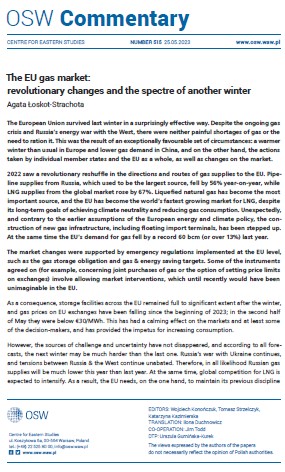
The European Union survived last winter in a surprisingly effective way. Despite the ongoing gas crisis and Russia’s energy war with the West, there were neither painful shortages of gas or the need to ration it. This was the result of an exceptionally favourable set of circumstances: a warmer winter than usual in Europe and lower gas demand in China, and on the other hand, the actions taken by individual member states and the EU as a whole, as well as changes on the market.2022 saw a revolutionary reshuffle in the directions and routes of gas supplies to the EU. Pipeline supplies from Russia, which used to be the largest source, fell by 56% year-on-year, while LNG supplies from the global market rose by 67%. Liquefied natural gas has become the most important source, and the EU has become the world’s fastest growing market for LNG, despite its long-term goals of achieving climate neutrality and reducing gas consumption. Unexpectedly, and contrary to the earlier assumptions of the European energy and climate policy, the construction of new gas infrastructure, including floating import terminals, has been stepped up. At the same time the EU’s demand for gas fell by a record 60 bcm (or over 13%) last year.
More...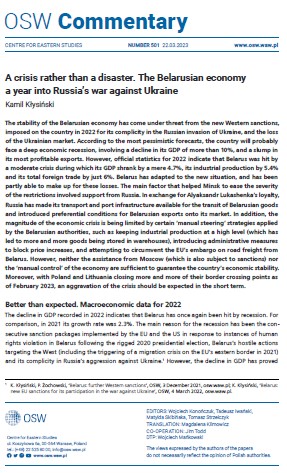
The stability of the Belarusian economy has come under threat from the new Western sanctions, imposed on the country in 2022 for its complicity in the Russian invasion of Ukraine, and the loss of the Ukrainian market. According to the most pessimistic forecasts, the country will probably face a deep economic recession, involving a decline in its GDP of more than 10%, and a slump in its most profitable exports. However, official statistics for 2022 indicate that Belarus was hit by a moderate crisis during which its GDP shrank by a mere 4.7%, its industrial production by 5.4%and its total foreign trade by just 6%. Belarus has adapted to the new situation, and has been partly able to make up for these losses. The main factor that helped Minsk to ease the severity of the restrictions involved support from Russia. In exchange for Alyaksandr Lukashenka’s loyalty, Russia has made its transport and port infrastructure available for the transit of Belarusian goods and introduced preferential conditions for Belarusian exports onto its market. In addition, the magnitude of the economic crisis is being limited by certain ‘manual steering’ strategies applied by the Belarusian authorities, such as keeping industrial production at a high level (which has led to more and more goods being stored in warehouses), introducing administrative measures to block price increases, and attempting to circumvent the EU’s embargo on road freight from Belarus. However, neither the assistance from Moscow (which is also subject to sanctions) nor the ‘manual control’ of the economy are sufficient to guarantee the country’s economic stability. Moreover, with Poland and Lithuania closing more and more of their border crossing points as of February 2023, an aggravation of the crisis should be expected in the short term.
More...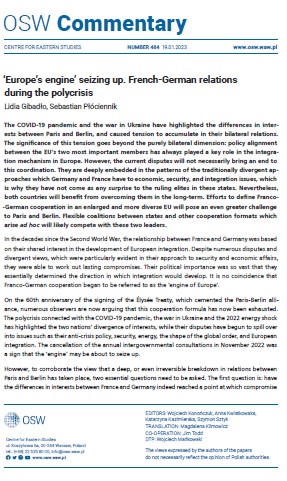
The COVID-19 pandemic and the war in Ukraine have highlighted the differences in interests between Paris and Berlin, and caused tension to accumulate in their bilateral relations. The significance of this tension goes beyond the purely bilateral dimension: policy alignment between the EU’s two most important members has always played a key role in the integration mechanism in Europe. However, the current disputes will not necessarily bring an end to this coordination. They are deeply embedded in the patterns of the traditionally divergent approaches which Germany and France have to economic, security, and integration issues, which is why they have not come as any surprise to the ruling elites in these states. Nevertheless, both countries will benefit from overcoming them in the long-term. Efforts to define Franco--German cooperation in an enlarged and more diverse EU will pose an even greater challenge to Paris and Berlin. Flexible coalitions between states and other cooperation formats which arise ad hoc will likely compete with these two leaders.
More...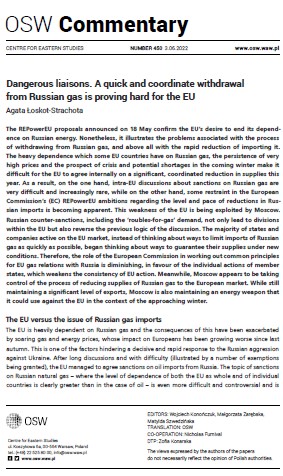
The REPowerEU proposals announced on 18 May confirm the EU’s desire to end its dependence on Russian energy. Nonetheless, it illustrates the problems associated with the process of withdrawing from Russian gas, and above all with the rapid reduction of importing it. The heavy dependence which some EU countries have on Russian gas, the persistence of very high prices and the prospect of crisis and potential shortages in the coming winter make it difficult for the EU to agree internally on a significant, coordinated reduction in supplies this year. As a result, on the one hand, intra-EU discussions about sanctions on Russian gas are very difficult and increasingly rare, while on the other hand, some restraint in the European Commission’s (EC) REPowerEU ambitions regarding the level and pace of reductions in Russian imports is becoming apparent. This weakness of the EU is being exploited by Moscow. Russian counter-sanctions, including the ‘roubles-for-gas’ demand, not only lead to divisions within the EU but also reverse the previous logic of the discussion. The majority of states and companies active on the EU market, instead of thinking about ways to limit imports of Russian gas as quickly as possible, began thinking about ways to guarantee their supplies under new conditions. Therefore, the role of the European Commission in working out common principles for EU gas relations with Russia is diminishing, in favour of the individual actions of member states, which weakens the consistency of EU action. Meanwhile, Moscow appears to be taking control of the process of reducing supplies of Russian gas to the European market. While still maintaining a significant level of exports, Moscow is also maintaining an energy weapon that it could use against the EU in the context of the approaching winter.
More...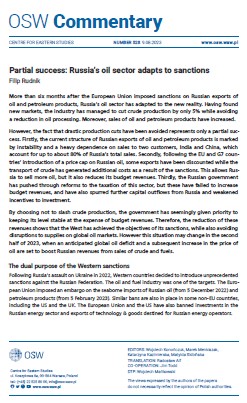
More than six months after the European Union imposed sanctions on Russian exports of oil and petroleum products, Russia’s oil sector has adapted to the new reality. Having found new markets, the industry has managed to cut crude production by only 5% while avoiding a reduction in oil processing. Moreover, sales of oil and petroleum products have increased. However, the fact that drastic production cuts have been avoided represents only a partial success. Firstly, the current structure of Russian exports of oil and petroleum products is marked by instability and a heavy dependence on sales to two customers, India and China, which account for up to about 80% of Russia’s total sales. Secondly, following the EU and G7 countries’ introduction of a price cap on Russian oil, some exports have been discounted while the transport of crude has generated additional costs as a result of the sanctions. This allows Russia to sell more oil, but it also reduces its budget revenues. Thirdly, the Russian government has pushed through reforms to the taxation of this sector, but these have failed to increase budget revenues, and have also spurred further capital outflows from Russia and weakened incentives to investment. By choosing not to slash crude production, the government has seemingly given priority to keeping its level stable at the expense of budget revenues. Therefore, the reduction of these revenues shows that the West has achieved the objectives of its sanctions, while also avoiding disruptions to supplies on global oil markets. However this situation may change in the second half of 2023, when an anticipated global oil deficit and a subsequent increase in the price of oil are set to boost Russian revenues from sales of crude and fuels.
More...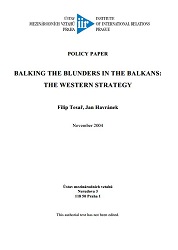
Since the beginning of the 1990s, the West was obliged to deal with several crises in the Balkans and pledged to a complete reconstruction of the post-war situation in the region. During this demanding process, the Western countries however maximised their traditional stereotyped attitudes towards the Balkan countries. Both the European Union and the United States have typecast the Balkan states according to the extent of the internal problems of these states, and according to their own ability to deal with such issues. Despite the good intentions behind the acting of the West, this process resulted in a mixture of shambolic strategies that have made the Western presence in the region very complicated. The West has been gradually loosing its military and managing respect, given its reluctance to pursue the proclaimed objectives. Such disinclination to act has played into the hands of the local bosses, who very soon found out how the system can be abused in order to satisfy both their electorate and the Western custodians. Nowadays, it is clear that such a hesitant attitude of the West towards the Balkans is no longer sustainable. A significant change in the Western strategy towards the Balkan countries is required, should the integration of the Balkans into the Western structures (i.e. NATO, EU) be successful.
More...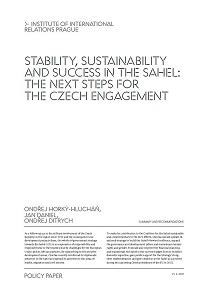
As a follow-up up to the military involvement of the Czech Republic in the region since 2013 and the consequent rural development projects there, the whole-of-government strategy towards the Sahel (G5) is an expression of responsibility and responsiveness to the related security challenges for the European Union and its African partners. By subscribing to the security-development nexus, Czechia recently reinforced its diplomatic presence in the Sahel and spread its activities to the areas of health, migration and civil society. To make its contribution to the Coalition for the Sahel sustainable and complementary to the EU’s efforts, Czechia should update its national strategy to build the Sahel’s forward resilience, expand the governance and development pillars and mainstream human rights and gender. It should also improve the financial planning and mainstream the Sahel in the current budget lines to mobilise domestic expertise, gain public support for the Strategy’s long-term implementation and give credence to the Sahel as a priority during the upcoming Czech presidency of the EU in 2022.
More...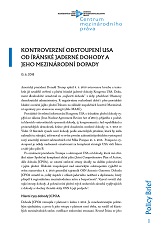
On May 8, 2018, US President Donald Trump went through with his threat and, this time, has not submitted his certification of the implementation of the Iranian nuclear agreement to the US Congress for approval. According to Trump, the document is the “worst deal” of Obama Democratic administration. He made his negative decision despite Iranʼs positive performance in the inspections by the International Atomic Energy Agency (IAEA).
More...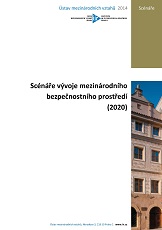
The document discusses the complexity of the global security environment and the emergence of hyper-risks due to interconnected anthropogenic systems. It suggests increasing resilience against hyper-risks by dividing existing systems into smaller units and creating circuit breakers to prevent cascading global reactions. The publication explores creative thinking about the future without precise probabilistic predictions, acknowledging the sudden and unexpected nature of significant events in complex systems, famously termed "black swans" by Nassim Taleb. It also examines geopolitical risks, the relative decline of US power, and the potential for a G-zero World scenario. The project's methodology is based on the complexity of the security environment, rejecting precise probabilistic forecasts and instead offering internally consistent hypotheses about future developments to aid in strategic thinking.
More...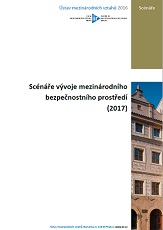
Držíte v rukou závěrečnou studii vznikající v rámci projektu TA ČR Scénáře mezinárodního bezpečnostního prostředí. Uzavírá se jí tříletý cyklus kolektivních spekulací týmu soustředěného v Ústavu mezinárodních vztahů o možnostech vývoje tohoto prostředí. Projekce, které vznikly jako výstupy těchto spekulací, nemají ambici být přesnými předpověďmi. Vysoká komplexita mezinárodního bezpečnostního prostředí jako systému, kde dochází k dynamické interakci množství předem daných skutečností, hybných sil a kritických neznámých, možnost takové předpovědi téměř vylučuje. Naše scénáře sledují jiný cíl: kombinací prediktivního (jaká budoucnost bude) a explorativního (jaká budoucnost může být) přístupu a záměrnou vícečetností podobně pravděpodobných projekcí vývoje v každém sektoru bezpečnostního prostředí být nástroji tvořivého promýšlení možných budoucností, rozšiřování horizontu úvah o tom, jak přispět k naplňování jejich z hlediska české zahraniční politiky nejvýhodnějších variant a zkoušení zažitých předpokladů o tom, co bezpečnostním prostředím, ve kterém se Česká republika nachází, hýbe.
More...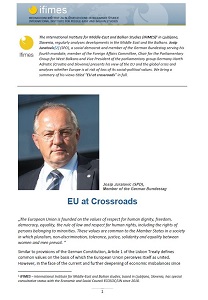
Similar to provisions of the German Constitution, Article 1 of the Lisbon Treaty defines common values on the basis of which the European Union perceives itself as united. However, in the face of the current and further deepening of economic misbalances since 2008, the migration trends intertwined with crises in its areas and now the coronavirus pandemic, this quote seems, more than ever before, like a document from ancient times. The European Union is at a crossroads and all its members, particularly Germany, now have to decide: should we finally act in line with the defined values or burry together with them the dream of a united continent that is more than just a sum of a number of national states?
More...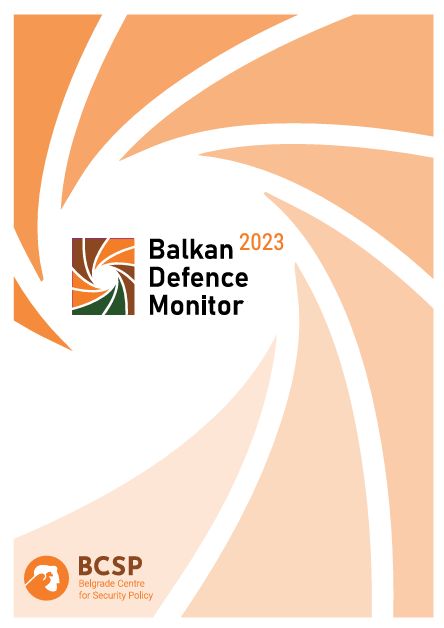
The main policy purpose of the Balkan Defence Monitor remains the same as in the last year. In recent years, the local elites have misused the lack of transparency related to defence policies in the Western Balkans, turning the military into a tool of domestic political promotion rather than a public good. This model of behaviour did not cause an armed conflict, and it is unlikely that it will do so in the future. However, it has poisoned the already fractious political ties between the countries of the region and fostered an atmosphere of distrust. To counter these negative occurrences, data on the defence sector needs to be made accessible to the citizens of Western Balkan countries and the international community. The ongoing war in Ukraine and the destabilisation of the European security environment make such an approach even more relevant.
More...
Defence system capturing is done in various ways. The authorities are using the procurement of armament from different parties to achieve foreign policy goals in order to reduce the external pressure on the authoritarian regime. Insisting on military neutrality and foreign policy balancing, Serbia is trying to keep access to both the Eastern and Western armament markets. Also, through non-transparent contracts, individuals and companies close to the government opulently profit at the expense of the military industry, as well as through exporting weapons often times conducted in contravention of both domestic and international law and norms.
More...